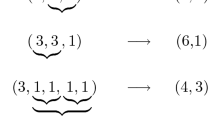Summary
In his note [5] Hausner states a simple combinatorial principle, namely:
.
He then shows how this principle can be used to prove:
-
(A)
Fermat's little theorem,
-
(B)
Cauchy's theorem for finite groups,
-
(C)
Lucas' theorem for binomial numbers.
Letε=(0,1, ...),ℱ 1−1 the family of all one-to-one functions from a subset ofε intoε andℳ 1−1 the family of all p.r. (i.e., partial recursive) one-to-one functions from a subset ofε intoε. A subsetα of ε is finite, ifα is not equivalent to a proper subset under a function inℱ 1−1. The setα is calledisolated, if it is not equivalent to a proper subset under a function inℳ 1−1. An isolated set can also be defined as a subset ofε which has no infinite r.e. (i.e., recursively enumerable) subset. While every finite set is isolated, there are\(c = 2^{\aleph _0 }\) infinite sets which are isolated; these sets are calledimmune. It is the purpose of this paper to generalize (H) to a principle (H*) for isolated sets and to show how (H*) can be used to prove generalizations of Fermat's little theorem and Cauchy's theorem for finite groups. We have been unable to generalize Lucas' theorem in a similar manner.
Similar content being viewed by others
References
Dekker, J.C.E.: Congruences in isols with a finite modulus. Math. Z.70, 113–124 (1958)
Dekker, J.C.E.: Isols and Burnside's lemma. Ann. Pure Appl. Logic32, 245–263 (1986)
Dekker, J.C.E., Myhill, J.: Recursive equivalence types. U. Cal. Publ. Math. (N.S.)3, 67–214 (1960)
Ellentuck, E.: Personal communication
Hausner, M.: Applications of a simple counting technique. Am. Math. Mon.90, 127–129 (1983)
McLaughlin, T.G.: Regressive sets and the theory of isols. New York: Dekker 1982
Nerode, A.: Extensions to isols. Ann. Math.73, 362–403 (1961)
Author information
Authors and Affiliations
Rights and permissions
About this article
Cite this article
Dekker, J.C.E. An isolic generalization of Cauchy's theorem for finite groups. Arch Math Logic 29, 231–236 (1990). https://doi.org/10.1007/BF01651326
Received:
Issue Date:
DOI: https://doi.org/10.1007/BF01651326




